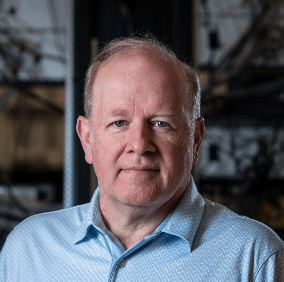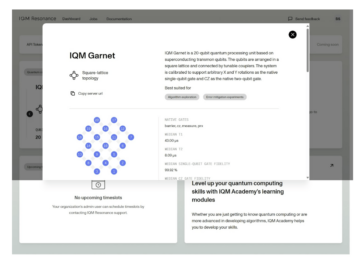
IonQ is getting closer to the opening of its new manufacturing facility in Bothell, Washington. While the company said in early 2023 that the new space would open in early 2024, IonQ CEO Peter Chapman recently told IQT News that a partial opening is imminent.
“This fall, we will have the first part of the building open to start manufacturing,” he said. “It’s taken a little less than a year, but in the construction world that’s light speed.”
Chapman said IonQ has spent months first working with an architect, doing extensive construction work on its 6,500-square-foot space in the existing facility, a former AT&T data center, as well as going through the local permitting process. “The bones of the building had to be upgraded,” he said.
“It has the power and weather-proofing and all the things you would need for a data center, but then we had to make a lot of changes to it,” he added. “This week [This interview occurred in late August.], they’re putting structural steel to support the roof so we can put air handling equipment on the roof.”
While IonQ is one of several companies in the sector that plan to take advantage of CHIPS Act funding from the federal government when it becomes available, Chapman said the company’s expansion plans in the Pacific Northwest do not hinge on the approval of that funding. Without revealing details, he said the money invested into readying the new facility involved “millions and millions of dollars” spent by IonQ, as well as Tenant Improvement funds provided by the property lessor, which has been reported as Alexandra Real Estate Equities.
“It’s a mix of funds, but it’s expensive, damn expensive.”
Speaking of spending money, IonQ also has invested a lot in continuing to improve the performance of its quantum computers, but as more organizations see the benefits of quantum computing versus classical computing as they complete experiments and pilot programs, the company knows it needs to focus just as much on how to make them more affordable.
“We’re working very hard, not only to make these things smaller, but also to make them cheaper,” Chapman said. “To get to really large numbers of qubits, you’ll have to network [quantum computers] together. So imagine, instead of having to buy one system, you need to buy eight systems to have one large quantum computer. Well, I can’t charge customers eight times the amount of money they would pay today so I need my quantum computers to become cheaper over time. Otherwise, only a country would be able to afford to buy a certain level quantum computer and would only have one of them because they’re half a billion dollars each. We don’t want that. We want these things to get down to the point where they are more like blade servers. So we’re busily working on the questions of how can we shrink them and how can I make them more cheaply?”
Subscribe to IQT PRO to read much more from our recent interview with Peter Chapman.
Dan O’Shea has covered telecommunications and related topics including semiconductors, sensors, retail systems, digital payments and quantum computing/technology for over 25 years.
- SEO Powered Content & PR Distribution. Get Amplified Today.
- PlatoData.Network Vertical Generative Ai. Empower Yourself. Access Here.
- PlatoAiStream. Web3 Intelligence. Knowledge Amplified. Access Here.
- PlatoESG. Automotive / EVs, Carbon, CleanTech, Energy, Environment, Solar, Waste Management. Access Here.
- PlatoHealth. Biotech and Clinical Trials Intelligence. Access Here.
- ChartPrime. Elevate your Trading Game with ChartPrime. Access Here.
- BlockOffsets. Modernizing Environmental Offset Ownership. Access Here.
- Source: https://www.insidequantumtechnology.com/news-archive/ionqs-chapman-partial-opening-of-bothell-washington-facility-coming-soon/
- :has
- :is
- :not
- :where
- 15%
- 2023
- 2024
- 25
- 26
- a
- Able
- Act
- added
- ADvantage
- afford
- affordable
- AIR
- All
- also
- amount
- an
- and
- approval
- ARE
- AS
- AT&T
- AUGUST
- available
- BE
- because
- become
- becomes
- been
- benefits
- Billion
- BLADE
- Building
- but
- buy
- by
- CAN
- Center
- ceo
- certain
- Changes
- charge
- cheaper
- Chips
- CHIPS Act
- closer
- coming
- Coming Soon
- Companies
- company
- Company’s
- complete
- computer
- computers
- computing
- construction
- continuing
- country
- covered
- Customers
- data
- Data Center
- details
- digital
- Digital Payments
- do
- doing
- dollars
- Dont
- down
- each
- Early
- eight
- equipment
- Equities
- estate
- existing
- expansion
- expensive
- experiments
- extensive
- Facility
- Fall
- Federal
- Federal government
- First
- Focus
- For
- Former
- from
- funding
- funds
- get
- getting
- going
- Government
- had
- Half
- Handling
- Hard
- Have
- having
- he
- High
- Hinge
- How
- How To
- HTTPS
- i
- image
- imagine
- improve
- improvement
- in
- Including
- inside
- Inside Quantum Technology
- instead
- Interview
- into
- invested
- involved
- IONQ
- IT
- ITS
- just
- large
- Late
- less
- Level
- light
- like
- little
- local
- Lot
- make
- manufacturing
- max-width
- millions
- mix
- money
- months
- more
- much
- my
- Need
- needs
- network
- New
- news
- numbers
- occurred
- of
- on
- ONE
- only
- open
- opening
- organizations
- otherwise
- our
- over
- Pacific
- part
- Pay
- payments
- performance
- Peter
- pilot
- plan
- plans
- plato
- Plato Data Intelligence
- PlatoData
- Point
- posted
- power
- process
- Programs
- property
- provided
- put
- Putting
- Quantum
- Quantum Computer
- quantum computers
- quantum computing
- quantum technology
- qubits
- Questions
- Read
- Readying
- real
- real estate
- really
- recent
- recently
- related
- Reported
- retail
- revealing
- roof
- s
- Said
- sector
- see
- Semiconductors
- sensors
- Servers
- several
- smaller
- So
- Soon
- Space
- speed
- Spending
- spending money
- spent
- start
- steel
- structural
- support
- system
- Systems
- T
- Take
- taken
- Technology
- telecommunications
- tenant
- than
- that
- The
- Them
- then
- These
- they
- things
- this
- Through
- time
- times
- to
- today
- together
- told
- Topics
- true
- upgraded
- Versus
- very
- want
- washington
- we
- week
- WELL
- when
- which
- while
- will
- with
- without
- Work
- working
- world
- would
- year
- years
- you
- zephyrnet












